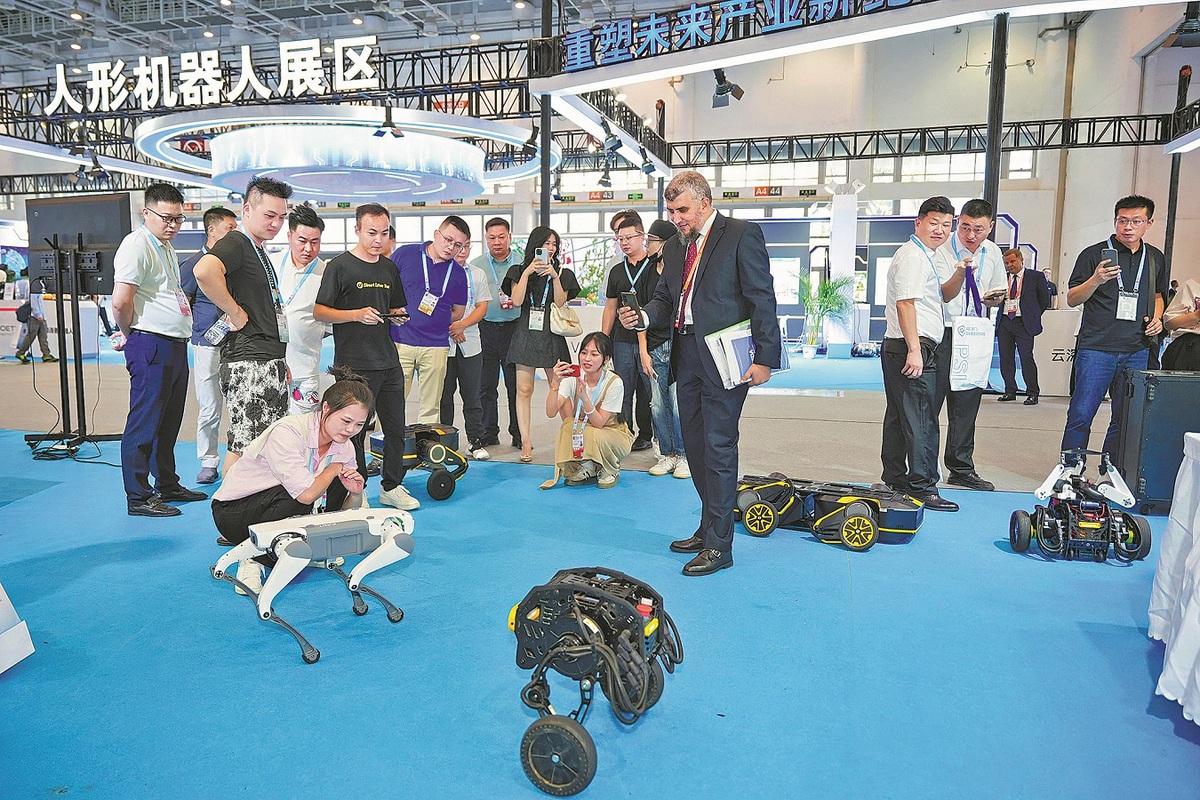AI offers fresh potential for group's cooperation


When Dipuo Mazibuko embarked on her first overseas travel in September, it was to China. She took a close look at the country's achievements in the field of artificial intelligence and gained a deeper understanding of the importance of working with China and other BRICS countries on AI.
Mazibuko, deputy director of evaluation and impact at South Africa's Department of Communications and Digital Technologies' Information Society and Capability Development Division, was attending the BRICS Excellence Training Program on Artificial Intelligence Technology and Governance, which took place in three Chinese cities.
The program was organized by the BRICS Partnership on New Industrial Revolution Innovation Center in Xiamen, Fujian province, ahead of the 2024 BRICS Summit, which is being held in Kazan, Russia, from Tuesday to Thursday.
During Mazibuko's 20 days of training — in Xiamen, in Hefei, Anhui province, and in Beijing — she and the other 29 participants from 16 countries attended lectures, seminars and discussions, and visited Chinese companies to learn about AI in China and other countries, AI governance, AI empowerment in public administration and AI plus applications in various industries.
Mazibuko said she was impressed with the theoretical and practical issues that were covered. "China's practices and global AI developments and trends have opened my mind," she said, adding that she was particularly impressed by the applications of AI in cybersecurity in China, and that applications based on the technology help improve public security.
Working with China on AI is essential for South Africa to develop AI policies and standards, she said.
Improved governance
"If we can learn about these standards and research policies, we can improve our governance," Mazibuko added.
South Africa is among the countries referred to in the BRICS acronym — the others being Brazil, Russia, India and China.
Chen Zezhao, deputy director general of the Office of the Xiamen Leading Group for the BRICS PartNIR Innovation Center, said the training program aims to promote international collaboration to improve technological innovation, empowerment and capacity-building of AI technology in order to bridge the digital divide.
The program strengthens the exchange and sharing of AI development policies and successful practices among BRICS countries and other emerging markets and developing countries, she said. "It is conducive to enhancing mutual understanding and further improving AI technology and governance capabilities."
Juliano Danilo Spuldaro, a coordinator for the Business Research Program at the University of West Santa Catarina in Brazil, said the training in China gave him insights at both a macro and a micro level.
"What I have learned from the program is to think from a macro perspective of AI governance at the governmental level to a micro perspective of AI adoption in business and daily life," he said.
Spuldaro said he was particularly impressed by the Multi-Hazard Coupling Experimental Platform at Tsinghua University's Hefei Institute for Public Safety Research, where he learned how AI can be applied in disaster prevention and reduction.
"AI should be used to solve public problems like disasters," he said, adding that China's technology could help Brazil deal with challenges such as floods and wildfires in the Amazon rainforest.
Talking of AI's potential for tackling social inequalities in Brazil, he said, "I think one of the problems that AI can help us to solve is the imbalance between rich and poor."
Over the past few years, the leaders of BRICS countries have demonstrated their recognition of the significance of AI and other emerging technologies, reaffirming their commitment to promoting these technologies.
In 2022, the Beijing Declaration of the 14th BRICS Summit called on BRICS members to jointly address the risks and ethical dilemmas related to AI, share best practices and develop a common governance approach that ensures the ethical and responsible use of AI.
Last year, the Johannesburg Declaration of the 15th BRICS Summit reaffirmed the commitment to strengthening intra-BRICS cooperation to solidify the BRICS Partnership on New Industrial Revolution and create new opportunities for accelerating industrial development.
The BRICS cooperation mechanism is a vital platform for collaboration among emerging markets and developing countries, said Chen of the BRICS PartNIR Innovation Center.
Last year, BRICS set up an AI study group to drive innovation and collaboration among its member countries. The establishment of the group formalized and strengthened collaboration among BRICS countries in AI, offering a structured platform for member states to exchange knowledge and resources.
Spuldaro said China has built the capacity to lead the development of AI technology, and in the BRICS framework this role is even more important because most BRICS members would find it difficult to catch up with the technological progress.
He called for the establishment of a solidarity mechanism to connect countries at different stages of AI adoption.
Collaboration on AI among BRICS countries is about far more than creating and selling technologies to other countries, he said.
Pooling resources
Radik Shafigullin, deputy head of the executive committee of Kazan, also underlined the need to pool knowledge and resources relating to AI.
Shafigullin said the varied levels at which BRICS countries find themselves in developing AI underscore the need for them to work together.
AI collaboration among BRICS countries is still in its infancy, he said, but collaboration could begin in areas such as public health, security and climate change.
Shafigullin said that Russia and China both possess the wherewithal to invent new technologies, and if they pool their efforts they can help other countries gain more technologies and services more economically.
He stressed the need for a united approach among BRICS members.
"We should move in the same direction and avoid competing with each other. We should embrace innovation and be open to information and technology exchanges."
Shafigullin said he expects the net result of discussion at the BRICS summit in Kazan will be members working more closely together.




































